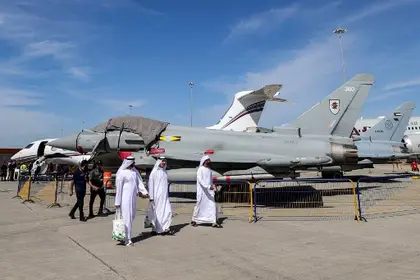Germany lifting its five-year block and greenlighting the export of European fighter jets to Saudi Arabia shows its willingness to tighten European defence collaboration, experts say — though the formation of a reliable arms export policy remains a tough nut to crack.
Having blocked the exports since the 2018 killing of Saudi journalist Jamal Khashoggi, the German government no longer sees “why it should oppose British plans [to sell] more Eurofighters to Saudi Arabia”, German Foreign Minister Annalena Baerbock confirmed earlier this week during a visit to Israel.
JOIN US ON TELEGRAM
Follow our coverage of the war on the @Kyivpost_official.
Germany vetoing the sale of 48 Eurofighter Typhoon fighter jets — jointly manufactured with the UK, amongst others — to Saudi Arabia over human-rights concerns had angered the Brits in particular.
The UK had even threatened to push Germany out of production to facilitate the sale, The Times and Handelsblatt reported last year.
The U-turn can be read as a message to Germany’s European partners that the country wants to become more reliable regarding defence exports and clear a major obstacle to closer European defence collaboration.
As any country involved can veto international sales of jointly manufactured products, export decisions have long caused tensions between Germany and its allies.
Berlin’s arms export policy, shaped by pacifist traditions, fluctuates depending on how changing government coalitions in Berlin interpret ethical imperatives and guidelines, according to Pia Fuhrhop, a researcher from the German Council on Foreign Relations (DGAP) think tank.

Europe Approves $4.1 Billion in Aid for Ukraine, Seeks Tougher Sanctions on Russia
“This fluctuation is quite problematic for some European defence projects, and partner countries find German policy quite unreliable,” she told Euractiv.
European allies but also the domestic defence industry have been arguing that international sales are crucial to make joint European defence projects profitable.
The Association of the German Aerospace Industry (BDLI) warned previously that the industry would face financial pressures if the Saudi deal was not greenlighted, while British Prime Minister Sunak is said to have lobbied Chancellor Scholz with the British defence industry in mind.
The position has been echoed by French lawmakers with Natalia Pouzyreff, an MP of French President Emmanuel Macron’s Renaissance party and member of the parliament’s defence committee, telling Euractiv that France considered “[international] exports a necessity to sustain production capacity”.
Shifting priorities
The public embrace of the Saudi deal by a Green minister is the clearest sign yet that the German government wants to prioritise and boost European defence relations in light of Russia’s war in Ukraine.
Germany’s coalition, consisting of Social Democrats, Greens, and the Liberals, had initially promised to restrain weapons exports in its 2021 government manifesto, refusing to supply countries involved in the Yemen civil war such as Saudi Arabia.
The policy was to be cemented in a comprehensive “defence-export control law”, devised by the Green-led economy ministry.
However, following Russia’s invasion, Germany has U-turned on its cautious defence policy, with its defence exports reaching a new record level in 2023, according to the economy ministry.
Long-term reliability questionable
Having to reflect the shift, the presentation of export legislation that would fix binding guidelines for how Germany decides on exports – and could make the country a more predictable partner – has since been repeatedly delayed.
A spokesperson of the economy ministry told Euractiv that the cabinet is still working on drafting cornerstones.
In the absence of parliamentary agreement on the right level of restrictiveness, passing export legislation remains complicated – meaning export decisions will continue to be made on a case-by-case basis in the ministerial security council in the foreseeable future.
Namely, while Green ministers have been coming around on arms exports for a while, according to people with knowledge of the matter, coalition lawmakers remain divided.
“There are many MPs from the coalition parties who would not find the transfer of Eurofighters to Saudi Arabia justifiable,” Sara Nanni, the Greens’ lead MP on defence policy told Euractiv previously.
Supplying fighter jets to a country like Saudi Arabia ”that interferes in the region in a destabilising way and has a poor human rights record” would not be justifiable, she argued.
Unsurprisingly, Green lawmakers criticised the government’s recent comments.
Marie-Agnes Strack-Zimmermann, the FDP’s head of the defence committee in the German Bundestag, was also sceptical, noting that “anyone who exports Eurofighters to Saudi Arabia must also immediately deliver Taurus cruise missiles to Ukraine.”
Bilateral agreements an option?
The German process is being closely observed by European partners. France, especially, is “paying a lot of attention to the new export control legislation”, Pouzyreff said.
The French government has so far not publicly commented on the issue.
Pouzyreff’s comments also suggest that bilateral agreements could be an alternative for more reliability.
Regarding exports of jointly produced defence goods, France and Germany are bound by the so-called Schmidt-Debré-Agreement — signed in the 1970s and amended recently — which stipulates that exports will not be blocked unless there is a national security issue, she pointed out.
Fuhrhop also noted that it would be easier to make joint projects economically viable by selling them to less controversial partners within the EU if the participating countries would agree on producing one standardised version of jointly planned products.
“Currently, each country often builds its own version because each army has special requirements,” she said.
Reprinted from EURACTIV.com. See the original here.
You can also highlight the text and press Ctrl + Enter






